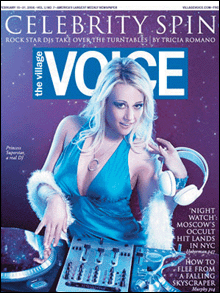 These days, you can’t tell the players in New York’s suddenly volatile weekly-newspaper world without a scorecard.
These days, you can’t tell the players in New York’s suddenly volatile weekly-newspaper world without a scorecard.
At the Village Voice, the 50-year-old granddaddy of alternative journalism, editor Don Forst and publisher Judy Miszner recently departed, their exits a byproduct of the Voice’s merger with the powerful New Times Media company. After a nervous meeting several weeks ago between the new conglomerate’s executive editor Mike Lacey and Voice staffers, Sydney Schanberg resigned his media column, columnist Nat Hentoff’s future seems cloudy, and more staff turnover appears inevitable as the venerable organ of progressive politics is pushed toward a new editorial model.

The news was equally dramatic last week at the New York Press, a weekly created in 1988 largely as an alternative to the Voice, when four of its five staff editors and writers resigned after management decided not to let them publish the riot-inspiring Prophet Mohammed cartoons. The departures of editor-in-chief Harry Siegel, managing editor Tim Marchman, arts-and-entertainment editor Jonathan Leaf, and City Hall reporter Azi Paybarah — a team that had been in place since last summer — leaves the future of the unstable Press up for grabs.
It’s rare enough to have this kind of upheaval at two competing papers simultaneously, but the turmoil at the Press and the Voice reflects a similar uncertainty about their editorial missions. It’s a sure indicator that the alt-weekly business, despite its long-entrenched emphasis on politics, pop culture, and stylistic license, is struggling for relevance in an increasingly fragmented marketplace where there are now numerous rivals — including the blogosphere — to the alternative press.
In the case of the Voice, the upheaval may lead to a different journalistic mission. In the case of the Press, it may offer an opportunity to finally define itself.
Lacey stresses that he is looking for more original reporting and “magazine-style journalism” at the Voice and bemoans the amount of similar-sounding commentary on its pages. “This industry has been afflicted by this kind of shut-in mentality,” he says. “Are people prepared to receive the message? There were a lot of people [at that meeting] who didn’t like what I said.”
Aware of the Voice’s left-liberal politics, Lacey says he’s not opposed to Bush-bashing, but insists he wants it to be homegrown.
“No one has given journalists more ammunition in America than this guy,” he says. “Let’s go get it.”
Marchman, who says the suddenly departed Siegel regime was trying to restore the Press to its status as “a genuinely independent” paper, adds: “The idea of the paper that the Press once was.... I think that paper’s dead. I think it will be an arts-and-entertainment weekly with the kind of standard content.”
“In the larger context of alt-weeklies,” he continues, “I think it’s a sad time in New York right now.”
The Voice of Change
The merger of New Times Media and Village Voice Media is a big-time business deal between the two largest alt-weekly chains in the US, and it created a new entity composed of 17 papers with a circulation of 1.8 million. (In a nod to the Village Voice brand, the new company is called Village Voice Media.) From the outset, speculation focused on whether the New Times would impose its editorial culture on the Voice, an aging liberal lion with a circulation of about 250,000 that has won three Pulitzers in its storied history, including one in 2000 in the international-reporting category for a series on AIDS in Africa. At this point, however, the paper is better known for its columns and criticism than for its enterprise reporting.
The 35-year-old Phoenix, Arizona–based New Times operation has built its reputation on long-form narrative journalism and its proclivity for investigative digging. In a departure with traditionally liberal alternative journalism, however, its papers don’t wave the banner of any particular political philosophy. San Francisco Bay Guardian founder, editor, and publisher Bruce Brugmann, who is involved in litigation against New Times, is a harsh critic who had dubbed the New Times ideology “libertarianism on the rocks with giant stocks of neo-con politics.”
On occasion, the company’s aggressive approach has backfired. Miami New Times editor Jim Mullin left that job last year after publishing a highly controversial story that included, among other things, allegations about former–Miami commissioner Arthur Teele’s sex habits. Teele, who was under indictment, shot himself to death as the story was hitting the streets. Some furiously blamed the paper and in a column that verged on a mea culpa, Mullin wrote that “no one knows if Teele read the article before ending his life,” but “at the least, it’s likely he’d heard about it.”